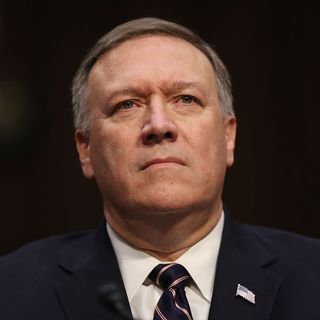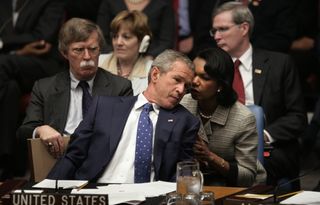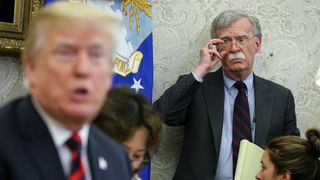Known as a “hawk among hawks”, US President Donald Trump’s new national security advisor, John Bolton, has devoted his long career in Washington to championing US military intervention in places like North Korea and Iran, and deriding international institutions that could erode US sovereignty, like the United Nations and the International Criminal Court.
The role
Created by executive order during the Truman administration in 1947, the National Security Council (NSC) is an interdepartmental body that acts as the chief foreign policy coordinating apparatus for the president. NSC staff serve at the pleasure of the president and are not subject to congressional approval.
Pompeo and the state of State

There are many models of how a national security advisor should operate, including the policy advocate model of Henry Kissinger in the Nixon and Ford administrations, and the chief foreign policy advisor role of Zbigniew Brzezinski in the Carter administration. Brent Snowcroft, however, is the man who many believe “established the standard” the for role. As the only person to be appointed national security advisor twice, Snowcroft famously saw his duty to be an “honest broker” for the president by working with the multiple organisations throughout the executive branch to impartially present the president with opportunities and challenges. His success has been attributed to a wise worldview, even-keeled temperament, respect for process and systems, respect for colleagues, deft management skills, and a close relationship with the presidents he served.
As Trump’s third national security advisor in 14 months, John Bolton inherits a position previously filled by former Army Lieutenant-Generals H.R. McMaster and Michael Flynn, the latter resigning 24 days into office due to “inadvertently” misleading administration officials on his contacts with the Russian government.
Flynn and McMaster were in many ways polar opposites. Flynn’s strongest attribute seemed to be his loyalty for and close relationship with President Trump. McMaster, by contrast, was known to possess nearly all of Snowcroft’s “honest broker” attributes except for a close personal relationship with the president. With a doctorate in military history, McMaster’s wonkish personality reportedly clashed with Trump, leaving the national security advisor with diminished influence in a White House that has proven dependent on close personal relationships.
The man
A well-established Republican foreign policy hand, John Bolton comes to the White House following a lengthy career in Washington, which has included stints in: the Reagan administration’s US Agency for International Development and Justice Department, George H.W. Bush’s State Department, and the George W. Bush administration’s State Department and UN office in New York.
Bolton first came into the public eye, however, when George W. Bush used a recess in Congress to appoint him as ambassador to the United Nations in 2007. Given Bolton’s hostility towards the intergovernmental body – including his infamous quip that of the UN’s New York headquarters “lost 10 stories, it wouldn’t make a bit of difference” – this was a controversial nomination. While Bolton went on to become a hero of America’s most interventionist conservatives, he lasted less than a year as ambassador when it became clear that a Republican-controlled Senate would never confirm him.

Bolton’s inability to be confirmed could be attributed to a confrontational foreign policy outlook that matched his personal demeanour. He was not known for winning over friends even amongst those with whom he shared ideologies or offices. According to one Republican senator, Bolton “abuse[d] his authority” and was a “kiss-up, kick-down sort of guy”. Numerous US intelligence officials also claimed that Bolton sought to deliberately skew intelligence for his own ends.
The tension he produced within the Bush administration became acutely visible when, after leaving his post at the United Nations, Bolton publicly disparaged his colleagues’ efforts to denuclearise North Korea, lamenting that “nothing can erase the ineffable sadness of an American presidency, like this one, in total intellectual collapse”. President Bush eventually concluded that Bolton was “not credible”, becoming “agitated at the mention” of his former UN ambassador and frustrated that he wasted political capital for Bolton’s appointment.
The issues
The widespread publicity Bolton received from his role at the United Nations gave him unprecedented media exposure, resulting in a book “Surrender Is Not an Option” and frequent appearances as a pundit on Fox News. Bolton systematically denounced those he sees as weak on foreign policy – such as Barack Obama over the Iran deal and Paris climate change accord – and backed those he deems sufficiently aggressive, including President Trump for his strikes on Syria and embrace of Taiwan.
Bolton’s most obvious departure from the Trump administration’s official line is his more combative views on Russia. As a media pundit, Bolton called on Trump to “strengthen the sanctions” on Russia and “reassure NATO allies” – two issues over which the president continues to appear uncomfortable.
While Bolton is often labelled a unilateralist and neo-conservative, his worldview is more complex. For instance, Bolton does not oppose multilateralism as much as he rejects the idea that the United States should be bound by an institution or treaty that limits its power and sovereignty. Unlike most neo-conservatives, Bolton does not see increased military engagement as necessitating foreign aid, state-building or the promotion of democracy. The decision to invade Iraq, for example, is still seen as a success by Bolton because it toppled the threat posed by Saddam Hussein, regardless of the fact that it did not bring stability. Although Trump and Bolton may differ in certain respects, the Bolton worldview – an aggressive and competitive playing field where no ground can be ceded – is far more similar to Trump’s than his two prior national security advisors.
Implications
As much as Bolton has alienated colleagues and vociferously argued with opponents, he is generally respected for his intellect and bureaucratic expertise in Washington. This will help him manoeuvre the complex national security system – and likely get his way – in what is the least experienced US administration in modern history. A former advisor confirmed as much, noting that Bolton’s “style will be to run an imperial NSC where the State and Defense departments are there to implement White House policy”.
Crucially, Bolton is arguably the most hawkish addition to the Trump administration, while Trump is sceptical about expanding US military footprint abroad. This will likely be their greatest challenge as neither Trump or Bolton are known for compromise. Furthermore, Bolton will need to navigate a Trump administration where loyalty and harmonisation with the president is deemed to be of the utmost importance.
Bolton’s uncompromising hawkishness, alienating interpersonal tendencies, and heavy focus on short-term goals over planning for “the day after” does not bode well for his success or longevity in office
Since his appointment, Bolton has said that he will embrace the “honest broker” model of a national security advisor despite this being a significant departure from his track record. Within a month of taking office, however, Bolton’s true colours already seem to have surfaced with him “never [having] convened a high-level meeting” of the NSC to debate the president’s options regarding Iran Deal.
More relevant to Australia – and a source of likely tension with the president – will be Bolton’s longstanding opposition to negotiations with North Korea, which at the time of writing reportedly may include the reduction of US troops from South Korea. While Trump’s withdrawal from the Iran Deal was an example of Bolton enabling the president’s most destabilising tendencies, it is unlikely that Bolton will broker a North Korea deal that includes the withdrawal of troops – something he would almost certainly regard as a forfeit of America’s regional influence.
Bolton’s uncompromising hawkishness, alienating interpersonal tendencies, and heavy focus on short-term goals over planning for “the day after” does not bode well for his success or longevity in office. There is little evidence Bolton has the characteristics that underwrote Brent Snowcroft’s success, but there is also little evidence that President Trump has the traditional characteristics that have defined successful presidents.






